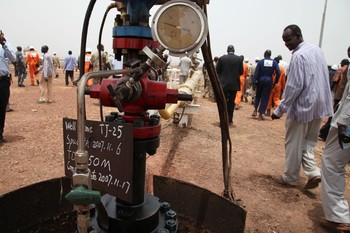South Sudan promises transparency on oil revenue
September 6, 2013 (KUACJOK) – South Sudan’s oil minister has promised more transparency on oil sales and revenue to promote accountability in the sector.

Dau revealed that since May this year, South Sudan had sold sold 9.79 barrels of crude oil from both the Nile and Dar Blends earning the country gross revenue of US $969 million.
The minister said out of the gross earning, US$238 will be paid to neigbouring Sudan for costs such as transportation and processing (US$91 million) and US $147 as per the Transitional Financial Arrangements (TFA).
He expressed optimism that South Sudan’s oil will continue to flow through Sudan due to the improved spirit of cooperation between the two countries.
“I take this opportunity to express my optimism that the renewed spirit of cooperation between the Republic of South Sudan and the Government of the Republic of Sudan will continue to guarantee the undisrupted flow of South Sudan crude oil to the international markets for the mutual benefit of both countries”, Dau said in the statement which was availed to the Sudan Tribune.
The flow of South Sudan’s oil through Sudanese territory is crucial for both countries. In a recent statement, the deputy Governor Central Bank of Sudan, Badr al-Deen Mahmoud said the country had lost about US$ 5 billion dollar when South Sudan moved to suspend oil production following a dispute over transit fees with Sudan.
South Sudan’s economy is also reliant on oil production and exportation. But the landlocked country relies on Sudan for exportation of its crude.
A looming threat by Sudan to block South Sudan’s oil flow through its territory has eased following last week’s meeting between President Al Bashir and his counterpart Salva Kiir.
The two leaders at summit in Khartoum on Tuesday last week promised to end the oil row and stick to bilateral agreements vital for cross border flow of oil.
(ST)
